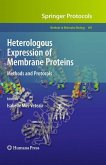Cells of all living organisms have the ability to respond to altered nutritional conditions. They have developed mechanisms to sense nutrient availability and to produce appropriate responses, which involve changes in gene expression and the production or degradation of certain enzymes and other proteins. In recent years, the understanding of nutrient-induced signal transduction has greatly advanced and the emerging picture is that nutrient signalling mechanisms evolved early in evolution. This book provides a detailed presentation and comparison of the key nutritional regulatory mechanisms in lower as well as higher eukaryotes, written by recognised experts in this expanding field.
Hinweis: Dieser Artikel kann nur an eine deutsche Lieferadresse ausgeliefert werden.
Hinweis: Dieser Artikel kann nur an eine deutsche Lieferadresse ausgeliefert werden.







